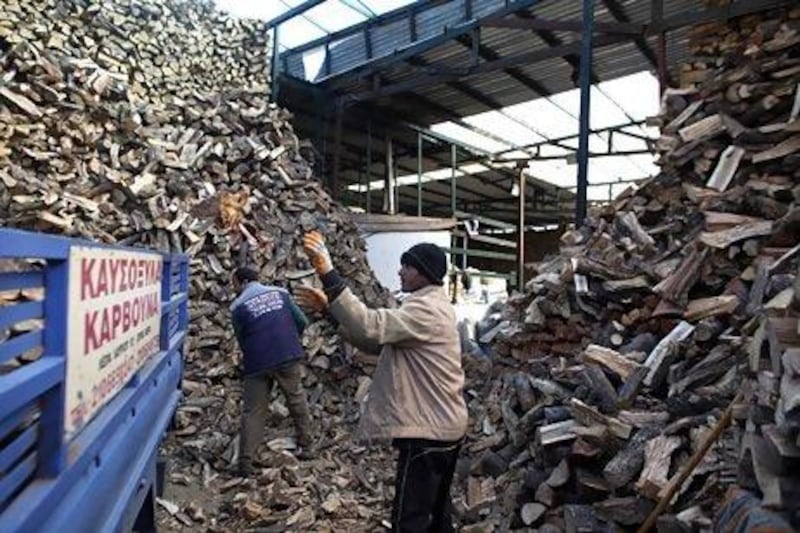Yule-tide logs have taken on an added significance for hundreds of thousands of Greeks this festive season.
With temperatures falling fast in the country, new taxes have sent the price of heating fuel soaring and many crisis-hit households are unsure they can afford to stay warm this winter.
The government in October abolished tax breaks on heating fuel in a bid to claw back millions of euros in tax revenue lost to petrol smuggling.
In doing so, it created a stark choice for Greeks whose spare income has already been whittled down by three years of austerity cuts tied to EU-IMF bailout loans for the recession-hit country.
"Even people with regular salaries cannot pay [for heating oil]," says Sofia Kanaouti, 39, an Athenian who only has a part-time job as a university researcher.
"Last winter, we spent €1,500 [Dh7,190] on heating, this year we're going to need over €2,000," she said. Conditions are even worse in Greece's north where temperatures can fall to minus 15C in winter.
Last month, residents of the northern town of Kavala symbolically dumped ice in front of the parliament in Athens to protest their plight.
The fuel reform means a litre of heating oil costs €1.35 compared with 95 cents a year ago.
Evripides Stylianidis, the interior minister, has pledged €80 million to heat schools.
But local mayors and teacher unions insist the money is inadequate.
"Many of the tenants still owe payments from last year, so the building manager decided against fuel orders this year," says Nikos Bouskos, 45, an unemployed former Web designer.
In recent years, smugglers have taken advantage of the low price of heating fuel to pass it off as higher-price diesel for cars.
According to a recent study, a fifth of car fuel currently circulating in Greece has been siphoned off from heating and ship fuel reserves.
With oil-based fuels now out of the question for many, attention has turned to alternative forms of heating - wood in the form of logs and pellets for stoves, electrical heating panels or air conditioning.
Others have turned to illegal tree-felling.
Ms Kanaouti chuckles as she reads an advertisement from a subsidiary of the German engineering giant Siemens, offering heating solutions to "get rid of oil".
"We can't rid ourselves of the Germans," she says, a reference to anger in Greece towards European Union paymaster Germany's perceived role in pushing for ever-increasing austerity measures in return for state loans.
Meanwhile, the fall in demand has also hit petrol station owners.
"Housing fuel sales are down 80 to 85 per cent compared to last year," says Michalis Kioussis, the chairman of the federation of petrol station owners.
Another garage owner, Stefanos Karablias, says demand can only rise if temperatures continue to drop.
But many households say they will hold out as long as they can.
"We still have oil in the tank from last year, it will be enough to warm us at least until Christmas," says Anastassia Kanellou, 64.
Others are not so lucky.
In the Greek mountain town of Kastoria, less than an hour from the Albanian border, Kostas Tsitskos, 88, can't afford fuel to heat his home against the winter's cold. So he and his son live in a single bedroom, warmed by a small electric heater.
"One room is enough," says Mr Tsitskos, who lives on a €734 pension and doesn't have the €1,000 a month he needs to buy heating oil.
With an economy that has contracted for five years, Kastoria hasn't received funds from the central government to heat schools and the mayor says he will close all 53 of them rather than let children freeze, a step already taken in a nearby town. Lorryloads of wood are arriving from Bulgaria as families search for alternative fuels.
"This is the coldest place in Greece," says Emmanouil Hatzisimeonidis, Kastoria's mayor. "It's winter from October to April. This year we are very lucky. Last year, it was snowing for four months."
When temperatures fall below freezing, Mr Tsitskos spends most of his time in his bedroom and rarely leaves the house, he says. For meals, he and his son move the electrical heater to the kitchen. Other older residents in the town spend their days at a senior centre and cafes to save on heating costs, returning home only to sleep, he says.
Austerity measures have cut government salaries and benefits, raised the retirement age and reduced services.
The household price for heating oil in Greece reached €1,266 per 1,000 litres in the second quarter of this year, surging 48 per cent from a year earlier, according to the International Energy Agency (IEA) based in Paris. The same quantity costs €861 in the United Kingdom, according to the IEA, and €790 in New York, according to a state agency.
Greeks pay both excise and value-added taxes on heating oil that can make up 42 per cent of the total cost. The mayors of the region are petitioning the government to be exempted from the tax.
Greece's oil prices are high because of laws that protect the country's two refining companies and prevent competition, says Pavlos Eleftheriadis, a lecturer in law at the University of Oxford in England, who studies monopolies.
"The Greek political system works for the insiders," said Mr Eleftheriadis, a native of Greece.
"If you're an insider, there will be an attempt to protect you. If you're a poor person in Kastoria, you are on your own."
At a Kastoria senior centre in a small building next to the lake, several dozen grey-haired men play cards and pay 80 cents for coffee. Among them is Mr Tsitskos.
He says the suffering he sees now reminds him of the devastation caused by the German occupation during the Second World War.
"People were looking in the garbage for food then and they are now," Mr Tsitskos said. "In the Second World War, people were selling furniture for food. If the situation continues now, we will be selling our furniture."
Mr Tsitskos has relatives in Astoria, New York. He would leave for there if he could afford it, he says.
But that is out of the question.
"I was expecting a different type of life," he says.
"There's nothing that makes me happy. I'm living just to live."
* Compiled from AFP and Bloomberg News





